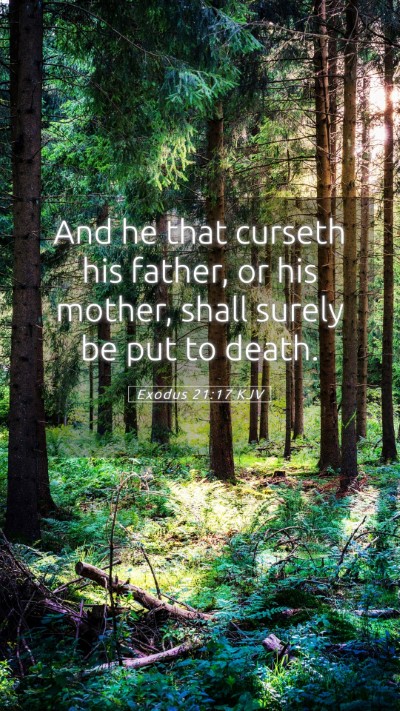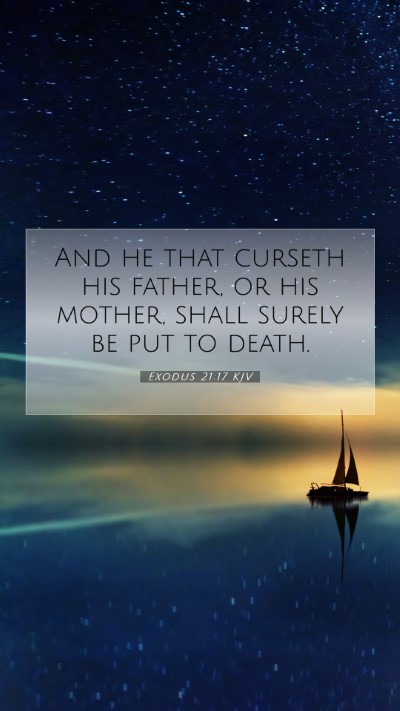Understanding Exodus 21:17
Exodus 21:17 states, "And he that curseth his father, or his mother, shall surely be put to death." This verse highlights the severe consequences for disrespecting parental authority, emphasizing the importance of honoring one's parents.
Bible Verse Meanings
The meaning of this verse can be understood through various perspectives. Below are combined insights from public domain commentaries to provide a comprehensive interpretation.
-
Matthew Henry's Commentary:
Matthew Henry emphasizes the fundamental principle of honoring one's parents as a vital aspect of living in accordance with God's will. He views the severity of the punishment as indicative of the serious nature of familial relationships and societal order.
-
Albert Barnes' Commentary:
Barnes notes that this commandment serves to protect the integrity of the family unit. He argues that cursing one's parents is a reflection of rebellion against God's ordained authority within the home.
-
Adam Clarke's Commentary:
Clarke interprets this command as a deterrent against disrespect while highlighting the role of parents in shaping moral character. He discusses the broader societal implications of familial respect and obedience.
Bible Verse Interpretations
This verse serves multiple interpretations, centering on familial respect, the dangers of rebellion, and the legal aspects of ancient Israelite society.
- Familial Respect: The command reflects the social order established by God, ensuring that families honor and support one another.
- Consequences of Rebellion: Such a punishment illustrates the seriousness of rebellion and aligns with other scriptural teachings on authority.
- Legal and Cultural Context: Understanding this verse within its historical context sheds light on the stringent laws governing community behavior in ancient Israel.
Scripture Analysis
Exodus 21:17 is part of the larger context of laws given to the Israelites. These laws, often referred to as the Code of Hammurabi, reflect the legal aspects of ancient civilizations. They served not only as divine commandments but also as societal regulations.
Comparative Analysis
This verse can be compared to similar sentiments found in the New Testament, particularly in passages that emphasize honoring parents and living righteously (Ephesians 6:1-3).
Bible Study Insights
In your Bible study groups or online Bible studies, this verse opens discussions about authority, family dynamics, and moral responsibilities.
Study Topics
- Importance of parental authority in contemporary society
- Moral responsibilities of children
- Application of Old Testament laws in modern life
Cross References
This verse relates to the following Bible passages:
- Exodus 20:12 - "Honor your father and your mother."
- Leviticus 20:9 - Punishment for cursing parents.
- Matthew 15:4 - Jesus references honoring parents in discussions of tradition.
Application of Bible Verses to Daily Life
Understanding Scripture, particularly verses like Exodus 21:17, can be transformative as they call for a deep respect for parents and authority figures, encouraging a culture of honor in our relationships.
Conclusion
In-depth Bible verse analysis helps uncover layers of meaning in Scriptural text. Through Exodus 21:17, we learn not only about the importance of honoring one's parents but also about the ramifications of disobedience that echo throughout biblical teachings.


